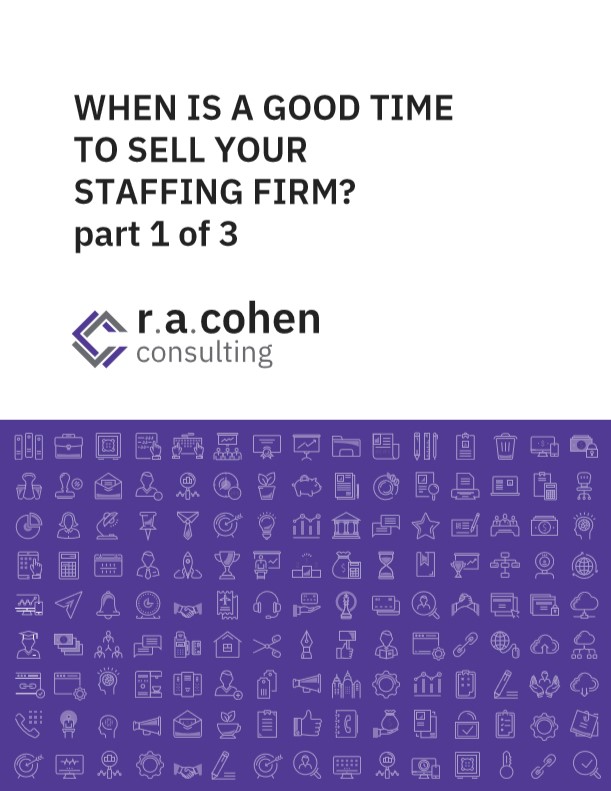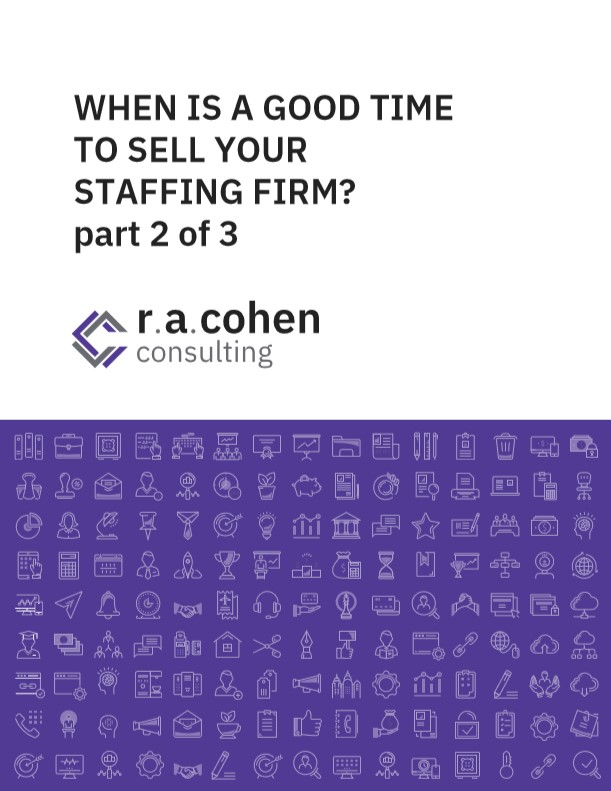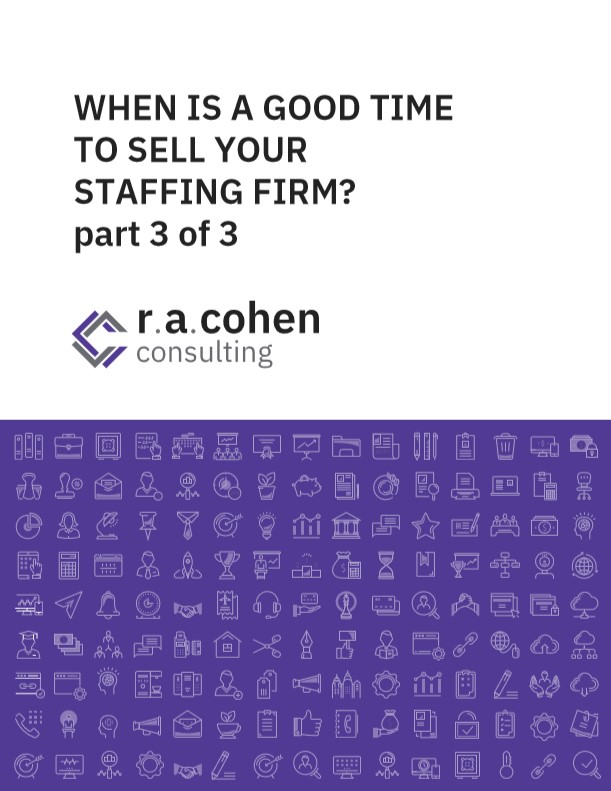Selling your staffing agency can be a significant decision. R.A.Cohen approach can help maximize the value of your staffing agency and ensure a successful sale. R.A. Cohen assess the agency’s market value, considering factors like industry trends, client relationships, and the unique value proposition of your business

Preparing your Staffing Agency for Sale
Timing is essential. Consider both the external economy and your firm’s internal conditions when you are deciding whether to sell.
- Ensure that your financials are clean and clear, preferably audited or reviewed and easy for potential buyers to read. Most smaller firms (under $10 million) only have compiled statements, unless their banks demand more. Ideally, these statements would include audited or reviewed financial statements such as income statements, a balance sheet, statement of cash flow, cash flow forecasts and pro forma income statements, supported by adequate notes to financial statements.
- Keep up with trade industry journals that report on sale transactions. Make a note of these buyers, who they are, where they are and what they do. Many of these buyers are private firms and could be a good acquirer for your firm. Check out their website, monitor how their other acquisitions are proceeding and then determine if they could be a candidate for you when you are ready to sell. You can determine how best to make contact at this point.
- Analyze the tax consequences of the sale. In a C corporation, if the owner sells the assets, money earned by the company is taxed twice: when it is earned and when it goes out to the shareholders. If an owner sells the stock of a C corporation, the money bypasses the company and goes directly to the owner; therefore, he only pay taxes once. In an S corporation, an LLC or an LLP, the owner can sell assets without any concern.
- If your lease is up for renewal, make sure the new agreement is transferable in the event of the sale of your business. More than one deal has fallen through simply because a buyer could not secure satisfactory leasing arrangements from a landlord when the business was to change hands.
- Limit your attorney’s participation to the legal aspects of the sale. The attorney’s job is to protect you legally, not run the deal. Attorneys are more used to win/lose transactions than dealing with a prospective partner; some can set the wrong tone for negotiations.
- A soft economy will have an adverse effect. Many prospective sellers have called us in the past few months saying they’d like to sell their business “but I understand that now may not be the best time to do it.” It could be that it’s the best time at the stage of growth their company is in, but it may not be best in terms of the state of the economy.
Free Valuation
Thinking about selling all or part of your staffing business?
What is your business worth in today’s market?
Before considering the sale of your business, get a free current market valuation of your company from us in summary form.
If you’re interested in receiving this no-cost, no-obligation summary valuation, please answer these few business profile questions. We’ll then contact you to obtain the additional information needed for the valuation. We will also send you a Confidentiality Agreement prior to your providing additional information.
Privacy Policy: All business information you provide to us will be kept in strict confidence. The contact information that you provide to us will be used to correspond with you. We will never sell, lease or rent your contact information to a third party. Please complete all fields below.
We look forward to speaking with you.
Sam Sacco
R.A. Cohen Consulting6241 Chalfont Circle
Wilmington, NC, US 28405
Direct: 910.769.4057
Cell: 910.262.5326
Fax: 910.782.2777
Email:sam@racohenconsulting.com
Brian Kennedy CPC
R.A. Cohen Consulting8 Pine Avenue North
Mississauga, ON, CA L5H 2P8
Direct: 416.229.6462
Fax: 416.222.0177
Email:brian@racohenconsulting.com
Mark Zacha CPC
R.A. Cohen Consulting11560 Caminito Gusto,
San Diego, CA. 92131
Mobile: 616.318.7979
Email:mark@racohenconsulting.com
LinkedIn : markzacha
Successful Strategies for selling your Staffing Agency
Many business owners are very disciplined and diligent about watching their metrics while they are building their business. In fact, it is generally because they have been taking care of business that their company is an attractive acquisition target for buyers.
Selling a business generally takes several months from beginning to end. Use this time to your advantage. Don’t stop doing all those little things that have made your business a success for so many years. Maintain your focus. It will pay off for you.
Maintain advertising and promotional activities when possible. You will benefit both short- and long-term. If you curtail these activities, you may find yourself trying to achieve your earn-out objectives from a standing start. Maintain momentum in your programs; just don’t go overboard
Evaluate the performance of each staff member and stay close to your key employees, re-recruiting them to ensure that they are comfortable and committed to your business. This is a time of great vulnerability for your staff. They are concerned that things are going on that they are not privy to or haven’t any control over. The stronger they are, the faster they will seek out alternatives if you are unable to reassure them about their future. Strong performers always have more options and opportunities than weaker or less experienced staff.
Evaluate the profitability of each client’s effect on your margins, wear and tear on internal staff, timeliness of payment and other costs of maintaining that client. Not all clients are created equal. Some large-volume accounts are poorly supervised and offer limited feedback on your workers. Others can demand far too much of your staff’s time, particularly those who offer only short-term assignments that require frequent dispatching calls. Some clients pay faster than others. Some have lower margins. These areas are all worth examining.
Increase margins where possible, particularly if you have differentiated your firm through added value, better service and by staying close to your customer. If you are delivering Rolls Royce service, you can’t stay in business if clients are only willing to pay Chevy prices. Determine who you are and what segment of the market you are geared to serve. If your staff is accustomed to providing a high level of service, they will continue to do so even if you lower your prices to match a competitor or a customer’s demand.
Weed out poor performers and malcontents. This is something we tend to feel we do all the time, but there may be room for improvement. Poor performers can lower the standard for an entire office. Malcontents are at best a distraction and at worst a cancer eating away at your firm’s morale and productivity.
Determine whether you can increase sales by enhanced selling, advertising or recruiting efforts, and then do so. The old maxim about not cutting back in tough times on items or practices that can improve your business is sound, provided you will benefit through an increase in orders or candidates.
Maintain up-to-date and clean books. You will rely on your financial reporting process for critical business performance information during the selling process. It’s vitally important to make certain that your numbers are reliable, timely and credible.
Strategic Staffing Company Merger and Acquisition Consulting
At R.A. Cohen Consulting we provide a complete, and strategic consulting service. We are here with you every step of the way. As specialists in the M&A process, we understand all of the potential issues that could occur along the way and we use our extensive industry experience to ensure they don’t become a problem for your transaction.
Our approach will ensure you get the right deal, whether you are buying or selling a business.
Case Studies
The Greed Factor
Sometimes a seller is overly optimistic about his company’s potential and begins to feel that he may be selling himself short on total consideration and the terms of payment. One seller under a Letter of Intent (LOI) became somewhat greedy during the buyer’s due diligence process. At the time, the seller’s sales were flat and he insisted that the closing be postponed to include another quarter of sales in the hope of enhancing the purchase price.
We cautioned him about the possibility of losing his spot in the buyer’s queue and the possibility, however remote it seemed at the time, that sales would remain flat. But the seller was too optimistic. His sales fell, margins were squeezed and profits diminished significantly. Our ever-hopeful client said, “Let’s wait another quarter.”
We know that a seller never wants to leave money on the table, and we caution against this as much as anything else, however it is often wise to play out the hand as dealt, because there is no assurance the next hand will be any better. In fact, this client’s sales dropped again and he decided to go forward with the deal.
At this point, the buyer had a much bigger deal in its grasp and had put all other deals on hold. Our client became apprehensive because the terms the buyer had offered were so attractive that the offer was by far the best available to him. Now he had to wait for the buyer to go forward. Sadly, the client lost his priority in the buyer’s queue.
As the economy continued to weaken, more buyers decided to remain on the sidelines, and our seller had far fewer options than before. In the end, the client sold to the same buyer ten months after the last delay – for less cash, more stock and about the same total consideration, even though the seller’s business was now up 20% over its earlier peak performance. This owner was lucky to have averted a situation that could have had seriously deleterious effects on his family’s financial security.
LESSON: Don’t roll the dice when you have a good offer in hand.
Poor Advice from Professional Advisors
Sellers need professional advice. However the advice should be considered in view of the advisors’ area of expertise. Attorneys should focus on legal issues and the legal meaning of the words contained in the agreement; the attorney’s job is to protect the seller’s legal interests.
Financial advisors and CPAs should focus on the financial and tax implications of the deal. Their job is to do whatever they legally can to lower the tax impact for the seller. M&A advice is the responsibility of the intermediary hired to represent and counsel the seller on the merits of the transaction and to ensure that the price and terms are at market value or better and that the deal meets the stated objectives of the shareholders. It is risky to accept advice, however well meaning, from advisors trying to operate outside their primary area of expertise.
A seller we dealt with decided, based on advice from three well-meaning but uninformed advisors, that his business was much more valuable than the market indicated. These advisors were an attorney, a CPA and a relative with an MBA. All three wished only to help the seller; however, among them, they had participated in only a single business sale: that of a neighborhood florist shop to the owner’s son-in-law.
None had ever participated in the sale of a service firm. At a scheduled meeting with the potential buyer, who had flown in specifically for the meeting, this trio descended on him like a ton of bricks. The original agenda, scheduled to explain the terms of the buyers’ offer, was ignored while the advisors told the buyer why the seller’s business was worth far more than he had offered.
The seller’s advisors used many colorful charts and graphs to justify their views. However, the presentation had nothing to do with the circumstances of the seller’s business. The buyer showed great restraint. Although offended by the new agenda, the buyer was an M&A veteran who stayed clearly focused on the big picture and listened patiently.
Eventually the seller, upon understanding how close he had come to losing a great deal, took control of the situation, and the deal was completed.
LESSON: It is your responsibility to control your professional advisors and be sure that they understand that your objective is to complete the deal. Remember, “Experts advise, but owners decide.”
What our clients say about us
Sellers FAQ’s
The value of your staffing agency can be influenced by a variety of factors including its financial performance (revenue, profit margins), client base diversity, the sectors it serves, the robustness of its recruitment networks, and any proprietary technology or processes it utilizes.
Preparing your agency for sale involves ensuring financial records are accurate and transparent, improving operational efficiencies, diversifying the client base, ensuring compliance with all legal regulations, and possibly streamlining processes to make the business more attractive to buyers.
Selling a staffing agency typically involves valuing the business, preparing a sales memorandum, finding and vetting potential buyers, negotiating terms, conducting due diligence, and finally, closing the deal with legal and financial paperwork.
The timeframe can vary significantly based on the market conditions, the attractiveness of your agency, and how efficiently the sales process is managed. It can range from a few months to a couple of years.
Using a broker can provide access to a larger network of potential buyers and assist in navigating the complexities of a sale. However, selling independently may save on broker fees. The choice depends on your comfort with the sales process and your network reach.
Confidentiality is critical in the sale process. This can be maintained by only disclosing sensitive information after potential buyers have been vetted and have signed a non-disclosure agreement (NDA).
The right buyer is not just the one who offers the best price but also has the capability to continue growing the business and maintain its values and vision. Consider their experience in the industry and their plans for the business post-purchase.




